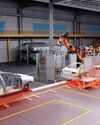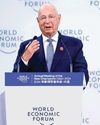
"And no war so bloody as a war between dragons." Sadly, by the time those words are uttered, both kinds of war have come to seem inevitable.
King Viserys I Targaryen (Paddy Considine) is dead, and his bratty son Aegon (Tom Glynn-Carney) has usurped an Iron Throne that rightfully belonged to his older half-sister, Rhaenyra (Emma D'Arcy). Season 1 ended with the spilling of first blood, when Aegon's brother Aemond (Ewan Mitchell) watched his dragon, Vhagar, devour Rhaenyra's son Lucerys (Elliot Grihault).
It doesn't matter that Aemond didn't intend to kill the boy. Lucerys' death, which came so soon after that of his peace-loving grandfather, sets off a wave of violence that mounts as the second season of the Game of Thrones prequel progresses.
As Rhaenyra's Black faction and Aegon's Green slide slowly toward all-out civil war, House of the Dragon cements its place in George R.R. Martin's dark universe by rejecting platitudes about honor and bravery that suffuse so many fantasy epics. Instead, this harrowing season exposes the unique forms of grief and guilt that result when one nation-and the family that leads it-declares war on itself.
In a welcome break with the relentlessly expository first season, which raced through decades' worth of traumatic births and deaths at a pace that made it tough to feel immersed or even invested in the palace intrigue, the first half of Season 2 unfolds patiently, in the immediate aftermath of Lucerys' fatal flight. His older brother, Rhaenyra's heir Jacaerys (Harry Collett), is at Winterfell, confirming the loyalty of the Starks.
This story is from the {{IssueName}} edition of {{MagazineName}}.
Start your 7-day Magzter GOLD free trial to access thousands of curated premium stories, and 9,000+ magazines and newspapers.
Already a subscriber ? Sign In
This story is from the {{IssueName}} edition of {{MagazineName}}.
Start your 7-day Magzter GOLD free trial to access thousands of curated premium stories, and 9,000+ magazines and newspapers.
Already a subscriber? Sign In

Q & A: Borge Brende
The World Economic Forum president talks with TIME editor Sam Jacobs

Q & A - Rene Haas
Arm's CEO on how his hardware is supporting the Fourth Industrial Revolution

The conflicts looming over 2025
WHEN DONALD TRUMP TOOK THE OATH OF OFFICE AS President in January 2017, his first foreign policy priority was to get tough on China. The Trump 2.0 Administration will continue that work. But when he strides back into the Oval Office in January 2025, Trump will also become responsible for U.S. management of two dangerous wars, the kinds of hot foreign policy crises he was fortunate to avoid during his first term.

Rev Lebaredian
Nvidia's vice president of Omniverse and simulation technology on training AI-powered robots

5 predictions for AI in 2025
New uses and policy questions come into focus

Roy Wood Jr. The comedian on his new stand-up special, the importance of working in food service, and learning from Keanu Reeves
8 QUESTIONS WITH Roy Wood Jr.

A call for global cooperation in the Intelligent Age
Cultivate wisdom along with innovation

The D.C. Brief
IN THE END, THE THREAT OF A FARright revolt proved more menacing than most imagined, as Republican Mike Johnson initially came up short on Jan. 3 during the first balloting to keep him as Speaker.

The digital labor revolution
OVER THE PAST TWO YEARS, WE'VE WITNESSED advances in AI that have captured our imaginations with unprecedented capabilities in language and ingenuity. And yet, as impressive as these developments have been, they're only the opening act. We are now entering a new era of autonomous AI agents that take action on their own and augment the work of humans. This isn't just an evolution of technology. It's a revolution that will fundamentally redefine how humans work, live, and connect with one another from this point forward.

Tech we can trust
Serving humanity's best interests must be at the center of progress